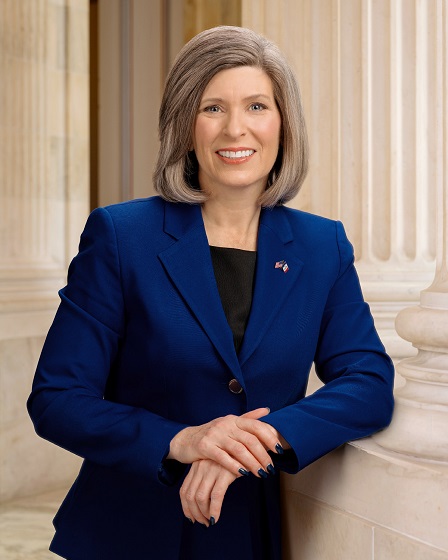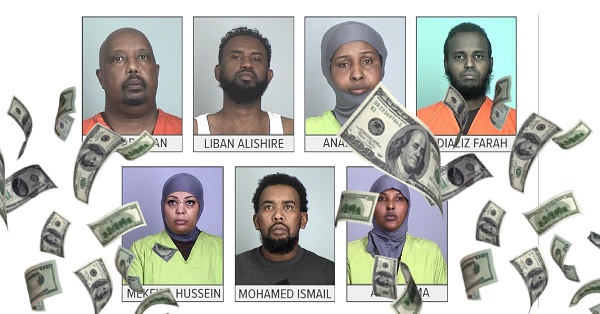Business
‘Accountability Is Coming’: Joni Ernst Sends Musk’s DOGE ‘A Trillion Dollars’ Worth Of Ideas To Gut Gov’t Spending

 From the Daily Caller News Foundation
From the Daily Caller News Foundation
Republican Sen. Joni Ernst of Iowa sent Department of Government Efficiency (DOGE) co-chairs Tesla CEO Elon Musk and former Republican presidential candidate Vivek Ramaswamy a letter Monday with ideas for cuts that could save the federal government over $2 trillion.
Trump named Musk and Ramaswamy as co-chairs of DOGE on Nov. 12. In the seven-page letter, Ernst’s suggestions ranged from addressing unused space in buildings to uncommitted spending for COVID relief, with the proposed cuts totaling over $2 trillion.
Ernst has focused on government waste since her election to the United States Senate in 2014, with a recent focus on the effects of telework and remote work on federal agencies.
“When faced with proposals to trim the fat from Washington’s budget, members of Congress from both parties act like Goldilocks,” Ernst wrote. “It’s too little or too big, always too hard, and never just right. But the real ‘make-believe’ of this fairy tale is that it’s impossible to reduce Washington’s budget without causing pain. Most Americans aren’t even benefitting in any meaningful way from hundreds of billions of dollars being wasted.”
“While you’re seeking ‘super high-IQ small-government revolutionaries’ for ‘unglamorous cost-cutting,’ all that’s really needed is a little common sense. If you can’t find waste in Washington, there can only be one reason: you didn’t look,” Ernst continued.
Three rail projects in California with a combined price tag of over $135 billion, $213 million in unemployment payments to millionaires, $31 million in pay to government employees with no assigned duties and $10 billion in inaccurate Supplemental Nutritional Assistance Program payments are among the programs Ernst listed as potential cuts. Ernst also said there was over $1.6 trillion in uncommitted COVID relief spending.
Ernst announced Friday she would lead a Senate DOGE caucus to work alongside Musk and Ramaswamy, while Republican Rep. Marjorie Taylor Greene was named as chair of a House Oversight Committee subpanel called the Delivering on Government Efficiency panel.
“I have a simple message to the bureaucrats who haven’t shown up for work in years and the government contractors and grantees collecting millions to study how fast a shrimp runs on a treadmill – buckle up because accountability is coming,” Ernst said in a statement provided to the Daily Caller News Foundation. “My decade-long mission to make Washington squeal has created an exhaustive list of more than $2 trillion worth of waste, fraud, and abuse that I will work with DOGE to cut. We are going to break down the nonsense that has taken over Washington and put in its place a government that actually works for the people.”
Ernst previously questioned USAID over an employee who improperly received “locality pay” for the Washington, D.C. area despite living in Florida, and requested a staff briefing after a second instance of improper locality pay involving another USAID employee living in North Carolina was reported.
In an August 2023 letter requesting a review of the issues involved with telecommuting sent to 24 government agencies, Ernst cited a media account of a VA employee who attended a staff meeting while taking a bubble bath.
Ernst wrote the Environmental Protection Agency (EPA), urging the agency to take emergency action in an August 28 letter sent to EPA Administrator Michael Regan about contaminants that built up in the drinking water of federal buildings left unoccupied by a shift to remote work.
Ernst introduced the Stopping Home Office Work’s Unproductive Problems (SHOW UP) Act, in September 2023 as part of a package of legislation to rein in the “administrative state.”
“This is by no means an exhaustive list, and I will be providing many more recommendations soon,” Ernst wrote. “My team and I are ready to help you make some prime cuts.”
The Trump-Vance transition team did not immediately respond to a request for comment from the DCNF.
Business
Feds pull the plug on small business grants to Minnesota after massive fraud reports

The Small Business Administration is moving to freeze grant money flowing into Minnesota after explosive allegations of large-scale fraud tied to state oversight failures, with SBA Administrator Kelly Loeffler signaling an immediate crackdown following recent independent reporting.
In a series of comments shared publicly by conservative commentator Benny Johnson, Loeffler said the agency is “cutting off and clawing back” SBA grants to the state while investigators dig deeper into what she described as a rapidly expanding fraud network.
Johnson wrote that Loeffler told him she was “disgusted and sickened” after reviewing footage from YouTuber Nick Shirley, whose on-the-ground reporting in Minnesota highlighted what he said were sham daycare and learning centers collecting millions in public funds despite showing little or no sign of legitimate operations.
According to Johnson, Loeffler blamed the situation on Democrat Gov. Tim Walz, accusing his administration of refusing to enforce basic rules governing small businesses and allowing fraud to flourish unchecked.
Johnson said Loeffler told him SBA investigators were able to identify roughly half a billion dollars in suspected fraud within days of focusing on Minnesota, calling the operation an “industrial-scale crime ring” that ripped off American taxpayers.
“Pending further review, SBA is freezing all grant funding to the state in order to stop the rampant waste of taxpayer dollars and uncover the full depth of fraud,” Loeffler said, according to Johnson’s account, adding that the total scope of the scheme remains unknown and could reach into the billions.
The controversy gained national traction after Shirley posted video of himself visiting multiple facilities, including a South Minneapolis site known as the Quality Learning Center, which he reported was approved for federal aid for up to 99 children but appeared inactive during normal business hours.
The center’s sign, Shirley noted, even misspelled the word “learning” as “learing.”
In the footage, a woman inside the building is heard shouting “Don’t open up,” falsely claiming Shirley and his colleague were Immigration and Customs Enforcement agents.
After the video circulated, Rep. Tom Emmer, a Republican, publicly demanded answers from Walz, questioning how such facilities were approved for millions in taxpayer funding.
Shirley’s reporting followed earlier investigations, including a November report by City Journal alleging that members of Minnesota’s Somali community had sent millions of dollars in stolen taxpayer funds overseas, with some of that money reportedly ending up in the hands of Al-Shabaab, a U.S.-designated terrorist organization.
While Walz’s administration has insisted it takes fraud seriously, the SBA’s decision to halt grant funding marks one of the most aggressive federal responses yet, underscoring how rapidly a local scandal has escalated into a national reckoning over oversight, enforcement, and accountability in Minnesota.
Business
Stripped and shipped: Patel pushes denaturalization, deportation in Minnesota fraud

FBI Director Kash Patel issued a blunt warning over the weekend as federal investigators continue unraveling a sprawling fraud operation centered in Minnesota, saying the hundreds of millions already uncovered represent “just the tip of a very large iceberg.”
In a lengthy statement posted to social media, Patel said the Federal Bureau of Investigation had quietly surged agents and investigative resources into the state well before the scandal gained traction online. That effort, he said, led to the takedown of an estimated $250 million fraud scheme that stole federal food aid intended for vulnerable children during the COVID pandemic.
According to Patel, the investigation exposed a network of sham vendors, shell companies, and large-scale money laundering operations tied to the Feeding Our Future case. Defendants named by the FBI include Abdiwahab Ahmed Mohamud, Ahmed Ali, Hussein Farah, Abdullahe Nur Jesow, Asha Farhan Hassan, Ousman Camara, and Abdirashid Bixi Dool, each charged with offenses ranging from wire fraud to conspiracy and money laundering.
Patel also said Abdimajid Mohamed Nur and others were charged in a separate attempt to bribe a juror with $120,000 in cash. He noted that several related cases have already resulted in guilty pleas, prison sentences of up to 10 years, and nearly $48 million in restitution orders.
Despite those outcomes, Patel warned the case is far from finished.
“The FBI believes this is just the tip of a very large iceberg,” he said, adding that investigators will continue following the money and that the probe remains ongoing. Patel further confirmed that many of those convicted are being referred to immigration authorities for possible denaturalization and deportation proceedings where legally applicable.
The renewed focus follows a viral video circulated by independent journalist Nick Shirley, which appeared to show multiple childcare and learning centers operating as empty or nonfunctional storefronts. The footage sparked immediate backlash from Republicans, including Vice President JD Vance.
House Majority Whip Tom Emmer accused Minnesota Gov. Tim Walz of sitting idle while massive sums were stolen from taxpayers. Walz addressed the allegations during a November press conference, before the full scope of the fraud became public, saying the scandal “undermines trust in government” and threatens programs meant to help vulnerable residents.
“If you’re committing fraud, no matter where you come from or what you believe, you are going to go to jail,” Walz said at the time.
Authorities say the alleged schemes date back to at least 2015, beginning with overbilling Minnesota’s Child Care Assistance Program and later expanding into Medicaid-funded disability and housing programs. One such housing initiative, aimed at helping seniors and disabled residents secure stable housing, was shut down earlier this year after officials cited what they described as large-scale fraud.
The fallout has already reached the federal level. Last month, President Trump announced the suspension of Temporary Protected Status for Somali nationals, arguing that Minnesota had become a hub for organized welfare fraud and money laundering activity.
-

 Digital ID1 day ago
Digital ID1 day agoCanadian government launches trial version of digital ID for certain licenses, permits
-

 Alberta1 day ago
Alberta1 day agoAlberta Next Panel calls to reform how Canada works
-

 International1 day ago
International1 day agoGeorgia county admits illegally certifying 315k ballots in 2020 presidential election
-

 Agriculture2 days ago
Agriculture2 days agoEnd Supply Management—For the Sake of Canadian Consumers
-

 Business1 day ago
Business1 day agoThe “Disruptor-in-Chief” places Canada in the crosshairs
-

 Artificial Intelligence1 day ago
Artificial Intelligence1 day agoUK Police Pilot AI System to Track “Suspicious” Driver Journeys
-

 Energy1 day ago
Energy1 day ago‘The electric story is over’
-

 International2 days ago
International2 days agoWorld-leading biochemist debunks evolutionary theory






